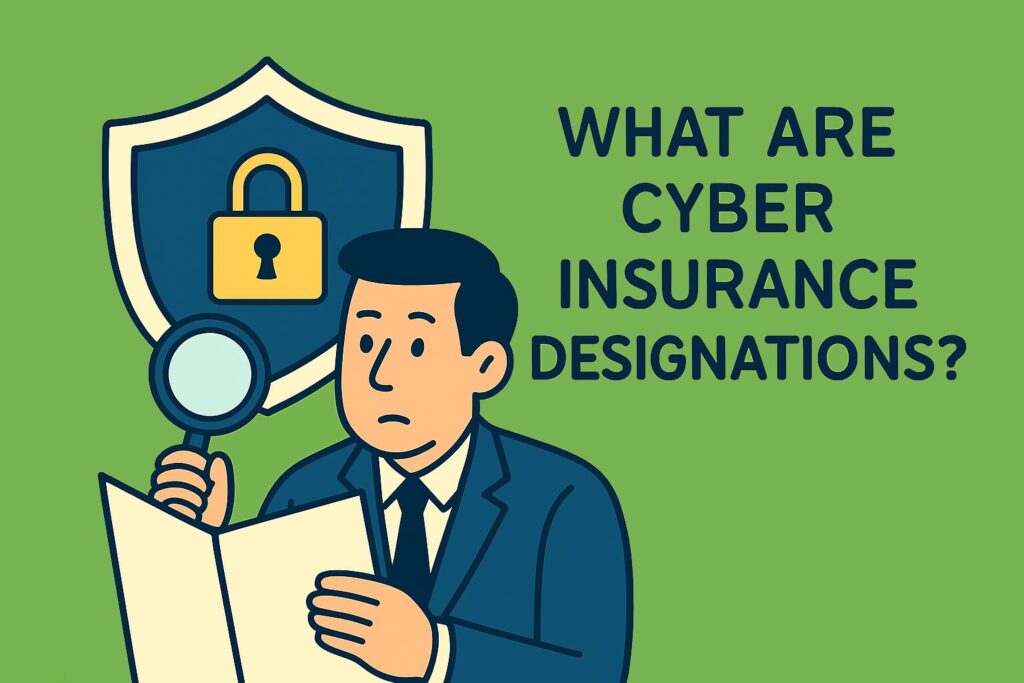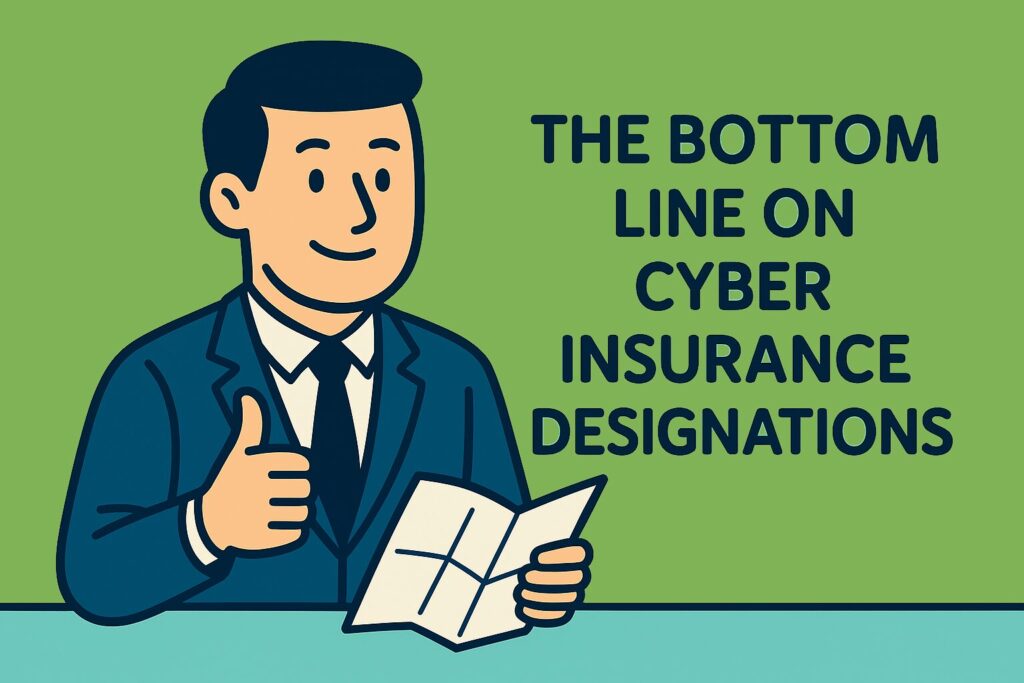What Are Cyber Insurance Designations?

The cyber insurance industry moves fast – sometimes too fast for comfort. One day, you’re dealing with basic data breaches; the next, you’re trying to explain why a ransomware attack isn’t covered under a standard policy. That’s where these insurance designations come in handy.
Think of a cyber insurance designation as your professional badge of honor. It’s proof that you know what you’re talking about when discussing cyber risks, not just winging it with generic insurance knowledge. These certifications show you can assess, underwrite, and manage cyber-related insurance risks with confidence.
This guide breaks down the most critical cyber insurance designations available today. Whether you’re looking to advance your career or want to stop feeling lost during cyber liability insurance conversations, we’ve got you covered.
Why These Designations Actually Matter
Cyber threats aren’t slowing down, and neither should your education. The cyber insurance industry desperately needs professionals who understand the nuances of digital risks. Here’s what a solid designation can do for you:
- Build real credibility with clients – No more fumbling through technical questions
- Stand out to employers – Show them you’re serious about cyber expertise
- Navigate tricky cyber liability insurance coverage – Understand what’s covered and what’s not
Let’s be honest: professionals with strong cyber credentials earn more money and get better assignments. It’s that simple.
The Top Cyber Insurance Designations Worth Your Time

1. Cyber Risk Manager (CyRM)
Who Runs It: Risk and Insurance Management Society (RIMS)
Perfect For: Brokers, agents, risk managers, underwriters, and claims specialists who want comprehensive training
What You’ll Learn:
- How to build solid cyber risk management foundations
- Essential cybersecurity frameworks that actually work
- Incident response when everything hits the fan
- Regulatory compliance for cyber liability insurance
Real-World Value: The CyRM gives you the tools to conduct thorough risk assessments using proven cybersecurity frameworks. You’ll guide clients through cyber preparedness and handle claims like a pro when breaches happen. This designation also helps you understand how different cyber insurance coverage options align with specific cybersecurity framework requirements.
2. Cyber COPE Insurance Certification (CCIC)
Who Runs It: Chubb and Carnegie Mellon University (impressive partnership)
Perfect For: Brokers and underwriters dealing with significant corporate risks
What You’ll Learn:
- COPE methodology for cyber risk (Construction, Occupancy, Protection, Exposure)
- Advanced underwriting that goes beyond fundamental checklists
- Real scenarios that’ll make you think
- Custom policy language for different industries
Real-World Value: This one’s gold when you’re working with large enterprises. The CCIC teaches you to assess exposures accurately and create cyber liability insurance solutions that fit like a glove. The program emphasizes the importance of proper cyber insurance coverage in complementing existing cybersecurity framework implementations.
3. Registered Cyber Liability Specialist (RCLS)
Who Runs It: Professional Liability Underwriting Society (PLUS)
Perfect For: Anyone specializing in cyber liability (obviously)
What You’ll Learn:
- The messy world of cyber liability underwriting
- Policy coverage details that trip up most people
- How to handle claims without losing your mind
- Breach response management from start to finish
Real-World Value: The RCLS prepares you for complex cyber liability situations, especially in heavily regulated industries like healthcare, finance, and legal. These sectors take compliance seriously.
4. Certified Information Privacy Professional (CIPP)
Who Runs It: International Association of Privacy Professionals (IAPP)
Perfect For: Anyone dealing with international privacy headaches
What You’ll Learn:
- Data privacy laws (GDPR, CCPA, HIPAA – the whole alphabet soup)
- Cross-border data handling without creating disasters
- How privacy compliance fits into insurance policies
Real-World Value: If you’re handling international cyber liability insurance policies, the CIPP credential is essential. Expertise in privacy law can make or break global coverage decisions.
5. Cyber Insurance Specialist (CIS)
Who Runs It: National Underwriter
Perfect For: Insurance agents and brokers just getting started
What You’ll Learn:
- Cybersecurity basics that every professional should know
- Standard cyber liability insurance coverage forms
- How to sell insurance to small and medium businesses
Real-World Value: This is your entry point into cyber insurance. The CIS gives you enough knowledge to discuss cyber risks confidently with small business clients and recommend appropriate coverage. You’ll learn how basic cyber insurance coverage works and how it connects to fundamental cybersecurity framework principles.
6. Certified Professional in Learning and Performance (CPLP) Designation
Now this one’s interesting. The CPLP designation isn’t specifically about cyber insurance, but it’s incredibly valuable for professionals in the industry who handle training and development. If you’re teaching others about cyber risks or developing educational programs, this certification proves you know how adults learn and improve performance.
The CPLP designation becomes especially useful when you need to educate clients about cyber insurance coverage options or train colleagues on implementing cybersecurity framework assessments. Many professionals find that combining the CPLP designation with cyber-specific credentials creates a robust skill set for client education and internal training programs
How to Pick the Right Designation for You
Choosing a cyber insurance designation isn’t rocket science, but it does require some thought:
- Think About Your Goals: Where do you want your career in the cyber insurance industry to go? Pick credentials that align with those ambitions.
- Consider Your Clients: If most of your clients require privacy compliance assistance, opt for the CIPP. Working with big corporations? The CCIC or CyRM makes more sense.
- Be Honest About Your Level: New to cyber insurance? Start with CIS. Have you been around the block? Consider advanced options, such as RCLS or CyRM.
Quick Comparison of Your Options
| Designation | Ideal Audience | Core Competencies | Complexity Level |
|---|---|---|---|
| CyRM | Risk managers, brokers, underwriters | Comprehensive risk assessment, incident response | Advanced |
| CCIC | Corporate underwriters | Industry-specific cyber risk analysis | Intermediate/Advanced |
| RCLS | Cyber liability specialists | Underwriting complexities, claims management | Advanced |
| CIPP | Internationally-focused brokers | Global data privacy and compliance | Intermediate/Advanced |
| CIS | New entrants to cyber market | Fundamental cybersecurity and policy basics | Beginner |
Let's Bust Some Myths

Myth #1: “All cyber designations are basically the same.” Wrong. These designations vary wildly in complexity and focus, reflecting different career stages and needs within the cyber insurance industry.
Myth #2: “Only underwriters need cyber insurance designations.” Not true. Brokers, claims adjusters, and risk managers all benefit from understanding cyber liability insurance complexities, claims handling, and regulatory compliance.
Myth #3: “Cyber designations become outdated quickly.” Actually, the good ones like CyRM and CIPP include continuing education requirements. They stay current with evolving cybersecurity frameworks and practices.
Making Your Designation Work for You
Don’t just get certified and forget about it. Here’s how to maximize your investment:
- Show it off – Put those credentials on your business cards, LinkedIn profile, and email signature
- Use what you learned – Apply your knowledge during client meetings and risk assessments
- Keep learning – Join industry groups and attend seminars related to your certification
- Stay current – Take advantage of professional development opportunities to keep up with cyber risks
The Bottom Line on Cyber Insurance Designations

Getting a cyber insurance designation sets you apart in a crowded field. It boosts your credibility, earns industry respect, and opens doors within the industry. As cyber threats continue to evolve, professionals with comprehensive, up-to-date expertise, as demonstrated by recognized designations, will lead the pack.
Choose a designation that matches where you want your career to go. It’s an investment in your long-term success, better client relationships, and your ability to deliver fundamental cyber risk management strategies. The cyber liability insurance landscape is constantly evolving, and those with relevant designations and a commitment to ongoing professional development opportunities will stay ahead of the curve.

